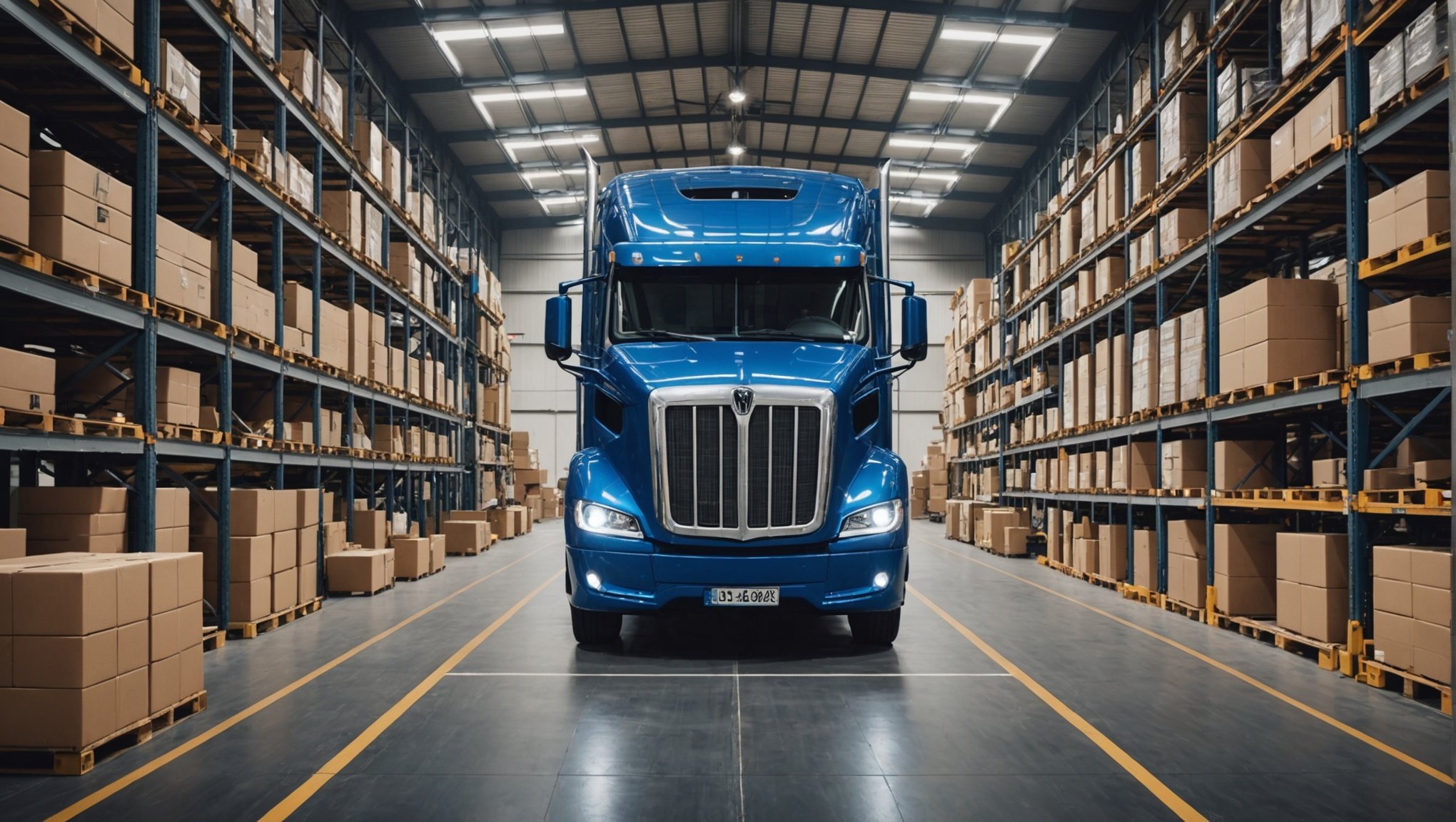Transforming Logistics: How AI Enhances Operational Efficiency in the Industry
The logistics industry, a cornerstone of global commerce, is undergoing a significant transformation driven by the advent of artificial intelligence (AI). This technology is not just a buzzword; it is a game-changer that is revolutionizing every aspect of logistics, from customer service and operational efficiency to inventory management and predictive maintenance.
Enhancing Customer Service with AI
In the logistics industry, customer service is paramount. AI is transforming this area in several key ways, making it more efficient, personalized, and responsive.
Additional reading : How Next-Gen Firewalls Revolutionize Enterprise Security: Unveiling Their Impact
Intelligent Service and Chatbots
AI-powered tools like Salesforce’s Einstein for Service are revolutionizing how customer inquiries are handled. These tools can instantly provide relevant shipping information, track orders, and suggest solutions for delays, enabling agents to resolve customer issues quickly and accurately[1].
For instance, companies like AAA and PenFed have seen significant improvements in customer service through AI-powered chatbots. AAA achieved a 30% case deflection rate, while PenFed saw a 60% case deflection rate and a 20% improvement in first-call resolution[1].
This might interest you : Transforming Automated Quality Control: The Powerful Role of Machine Vision
Omnichannel Experience
AI helps create a seamless customer experience across various channels, including web, mobile, email, and phone. This is particularly important as 65% of logistics companies still rely on traditional methods like fax, email, and phone. By providing consistent information and context, AI ensures that customers receive a modern, omnichannel experience that meets their expectations[1].
Personalization
AI can analyze customer data and interactions to provide personalized recommendations and next best actions for both customers and service agents. Given that 77% of shippers consider customer service more important than price, this personalized approach is crucial for acquiring and retaining customers[1].
Operational Efficiency and Decision Making
AI is not just about enhancing customer service; it is also a powerful tool for optimizing operational efficiency and decision-making processes.
Predictive Analytics
AI can analyze historical shipping data, demand patterns, and external factors to forecast volumes and potential disruptions such as port congestion or delays. This allows logistics companies to optimize fleet management, reroute shipments, and prevent customer churn by addressing service issues proactively[1].
Intelligent Logistics
AI-powered “control towers” provide real-time visibility into operations, enabling companies to quickly identify and respond to disruptions or opportunities. This real-time visibility is essential for improving resilience against future disruptions and enhancing overall operational efficiency[1].
Demand Forecasting
AI can analyze multiple data sources to provide more accurate demand forecasts, helping companies optimize inventory levels and capacity planning. This is critical for ensuring that businesses are prepared to meet demand without overstocking or understocking[1].
Optimizing Inventory Management with AI
Inventory management is a critical component of logistics, and AI is making significant strides in this area.
Real-Time Inventory Insights
AI solutions can provide real-time inventory insights, helping businesses minimize stockouts and overages. By analyzing data from various sources, AI can predict inventory levels and alert managers to potential issues before they arise[2].
Automated Warehouse Operations
AI-powered robots and automated systems are transforming warehouse operations. Companies like Amazon and DHL are using AI to automate tasks such as tracking inventory levels, transporting goods, sorting and picking packages, and monitoring shipments in real time. This not only maximizes space usage but also enhances the accuracy and efficiency of warehouse processes[5].
Route Optimization and Delivery Times
Route optimization is another area where AI is making a significant impact.
AI-Driven Route Optimization
AI-powered systems enable businesses to optimize routes in real time, ensuring temperature compliance and managing exceptions effectively. By leveraging advanced analytics and machine learning algorithms, these systems provide actionable insights that enhance visibility throughout the supply chain[2].
Reducing Delivery Times
AI can analyze traffic patterns, weather conditions, and other factors to optimize delivery routes, reducing delivery times and improving customer satisfaction. For example, DHL’s use of AI-powered Locus Autonomous Mobile Robots (AMRs) has dramatically improved productivity and accuracy in their order fulfillment tasks[5].
Predictive Maintenance and Cost Reduction
Predictive maintenance is a key application of AI in logistics, helping businesses reduce costs and improve operational efficiency.
Predictive Analytics for Maintenance
AI algorithms can analyze equipment data to forecast potential faults and prevent downtime. This proactive approach to maintenance reduces operational costs and minimizes disruptions. For instance, Mengniu Dairy’s AI-powered predictive maintenance has enhanced overall production decision-making and operational efficiency[4].
Reducing Operational Costs
By automating repetitive manual processes and optimizing operations, AI can significantly reduce operational costs. For example, early adopters of AI in supply chain management have enjoyed 15% lower logistics costs and significant improvements in inventory management and service levels[5].
Cold Chain Logistics and AI
Cold chain logistics, which involves the transportation of temperature-sensitive goods, is particularly challenging. AI is transforming this sector in several crucial ways.
Conflicting Priorities Management
AI helps carriers manage conflicting priorities, such as optimizing truck routes while minimizing thermal abuse. Technologies like two-way reefer controls and predictive data from AI enable carriers to make necessary corrections before issues arise[2].
Enhance Temperature Reporting
AI, in conjunction with specialized sensors and IoT devices, provides real-time temperature monitoring of reefer trailers. This eliminates the inefficiencies and potential manipulations associated with manual temperature checks. AI can also predict temperature anomalies and send automatic alerts to staff, ensuring prompt action[2].
Route Optimization in Cold Chain
AI-powered systems optimize routes for cold chain logistics, ensuring temperature compliance and managing exceptions in real time. This comprehensive monitoring system enhances reliability and ensures that goods are delivered safely and efficiently[2].
Practical Insights and Actionable Advice
For businesses looking to integrate AI into their logistics operations, here are some practical insights and actionable advice:
Integrate AI with Existing Systems
Successful implementation of AI requires a strategic approach that integrates AI capabilities with existing systems and processes. This ensures seamless adoption and minimal disruption to ongoing operations[1].
Focus on Change Management
Change management is crucial when introducing AI. Ensuring that employees understand the benefits and are trained to use new AI-powered tools is essential for adoption and customer acceptance[1].
Leverage Advanced Analytics
Businesses should leverage advanced analytics and machine learning algorithms to gain actionable insights into their logistics operations. This helps in identifying bottlenecks and optimizing processes for better efficiency[5].
Examples and Case Studies
Several companies are already seeing the benefits of AI in logistics.
Amazon’s AI-Powered Logistics
Amazon uses AI to predict customer demand, uncover damaged products, and optimize warehouse and inventory management. With over 750,000 robots operating in its fulfillment centers, Amazon has significantly streamlined its logistics operations and improved customer satisfaction[5].
DHL’s AI-Driven Innovations
DHL has deployed AI-powered Locus AMRs to automate and optimize picking and order fulfillment tasks. The company has also developed AI-powered software like OptiCarton to reduce packaging waste and optimize transportation routes[5].
Mengniu Dairy’s Digital Transformation
Mengniu Dairy has integrated AI across its supply and consumer sides to optimize supply chain processes. AI modules like neural network image recognition and reinforcement learning-based intelligent scheduling have replaced manual testing, ensuring accuracy and efficiency in critical test stages[4].
AI is not just a trend in the logistics industry; it is a transformative force that is enhancing operational efficiency, customer satisfaction, and overall business performance. By leveraging AI for predictive analytics, route optimization, inventory management, and predictive maintenance, logistics companies can reduce costs, improve delivery times, and gain a competitive edge.
As the industry continues to evolve, the integration of AI will become increasingly essential. Here is a summary of the key benefits and use cases of AI in logistics:
Key Benefits and Use Cases of AI in Logistics
-
Predictive Analytics: Analyze historical data to forecast volumes and potential disruptions.
-
Example: Logistics companies can optimize fleet management and reroute shipments to prevent customer churn[1].
-
Route Optimization: Optimize routes in real time to ensure temperature compliance and manage exceptions.
-
Example: AI-powered systems enhance visibility throughout the supply chain and reduce delivery times[2].
-
Inventory Management: Provide real-time inventory insights to minimize stockouts and overages.
-
Example: AI solutions help businesses predict inventory levels and alert managers to potential issues[2].
-
Predictive Maintenance: Analyze equipment data to forecast potential faults and prevent downtime.
-
Example: Mengniu Dairy’s AI-powered predictive maintenance has enhanced overall production decision-making and operational efficiency[4].
-
Customer Service: Enhance customer service through intelligent service tools and chatbots.
-
Example: Companies like AAA and PenFed have seen significant improvements in customer service through AI-powered chatbots[1].
-
Cold Chain Logistics: Manage conflicting priorities, enhance temperature reporting, and optimize routes for cold chain logistics.
-
Example: AI helps carriers manage conflicting priorities and ensures real-time temperature monitoring of reefer trailers[2].
In conclusion, AI is revolutionizing the logistics industry by enhancing operational efficiency, improving customer satisfaction, and driving business growth. As businesses continue to adopt AI technologies, they will be better positioned to meet the evolving demands of the market and stay ahead of the competition.
Table: Comparative Benefits of AI in Logistics
| Benefit | Description | Example |
|---|---|---|
| Predictive Analytics | Forecast volumes and potential disruptions. | Optimize fleet management and reroute shipments to prevent customer churn[1]. |
| Route Optimization | Optimize routes in real time to ensure temperature compliance. | Enhance visibility throughout the supply chain and reduce delivery times[2]. |
| Inventory Management | Provide real-time inventory insights to minimize stockouts and overages. | Predict inventory levels and alert managers to potential issues[2]. |
| Predictive Maintenance | Analyze equipment data to forecast potential faults and prevent downtime. | Enhance overall production decision-making and operational efficiency[4]. |
| Customer Service | Enhance customer service through intelligent service tools and chatbots. | Improve first-call resolution and case deflection rates[1]. |
| Cold Chain Logistics | Manage conflicting priorities, enhance temperature reporting, and optimize routes. | Ensure real-time temperature monitoring of reefer trailers[2]. |
By embracing AI, logistics companies can transform their operations, reduce costs, and improve customer satisfaction, ultimately driving growth and competitiveness in the industry.






